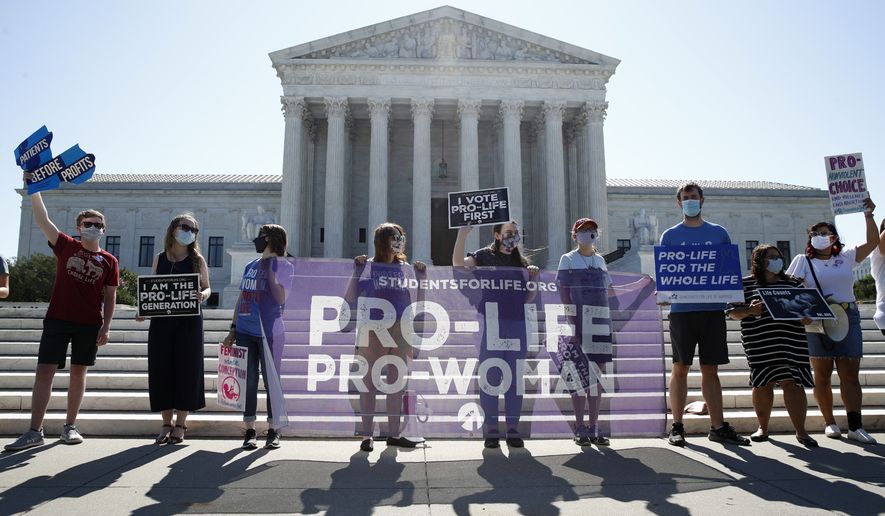The Supreme Court on Monday shot down a Louisiana law that would have shuttered most of the state’s abortion clinics, in a ruling that signaled the court is not prepared to go deeper in limiting abortion rights.
In the 5-4 ruling, Chief Justice John G. Roberts Jr. joined the four Democratic appointees in rejecting Louisiana’s law, which would have required doctors performing abortions to have admitting privileges at local hospitals.
Pro-choice activists said that hurdle was too high and could force clinics to close, effectively restricting the right to abortion established under Roe v. Wade. They feared a court with two Trump appointees, Justices Neil M. Gorsuch and Brett M. Kavanaugh, would begin to chip away at that landmark 1973 ruling.
But Chief Justice Roberts said the court was bound by a 2016 case, Whole Woman’s Health v. Hellerstedt, in which the court struck down a nearly identical law in Texas. He dissented from that ruling, arguing that the Texas law was valid. On Monday, though, he said he is bound by that precedent.
“I joined the dissent in Whole Woman’s Health and continue to believe that the case was wrongly decided. The question today, however, is not whether Whole Woman’s Health was right or wrong, but whether to adhere to it in deciding the present case,” he wrote.
That approach also suggests that the 47-year-old Roe decision is safe — at least for now.
Pro-choice activists said they will go on the offensive to try to expand abortion access beyond Roe.
“The landmark decision of Roe v. Wade is the floor, not the ceiling, for access to reproductive health care,” said Shaunna Thomas, executive director of the women’s group UltraViolet.
Conservatives, meanwhile, blasted the chief justice’s logic.
Ilya Shapiro, director of constitutional studies at the libertarian Cato Institute, said the chief justice had no problem overruling much older precedent in the 2010 Citizens United case on campaign financing and the 2018 Janus case dealing with dues for public-sector labor unions. He wondered why the chief justice now felt he couldn’t overrule a 4-year-old precedent.
“Maybe Roberts ought to stop playing 87-dimensional chess and just call the legal balls and strikes,” Mr. Shapiro said.
Louisiana’s law required abortion providers to have credentials and access to a hospital within 30 miles.
State officials argued that the law aimed to protect patients’ health in case of emergencies.
They also said the impact would be different from that in Texas, whose statute would have shut down more clinics and left large portions of the state without nearby access to abortions. Louisiana officials said their law wouldn’t have such a drastic effect.
Justice Stephen G. Beyer, a Clinton appointee, disagreed. He wrote in the court’s main opinion that all but one of Louisiana’s abortion clinics could be shuttered.
“The record here establishes that [the law’s] admitting-privileges requirement places a substantial obstacle in the path of a large fraction of those women seeking an abortion,” he said.
Justice Ruth Bader Ginsburg, a Clinton appointee, and Justices Sonia Sotomayor and Elena Kagan, both Obama appointees, agreed with Justice Breyer.
In dissent, Justice Samuel A. Alito Jr. wrote that the court should have tossed the case because abortion providers didn’t show sufficient legal injury. He argued that doctors and abortion clinics wrongly asserted the legal rights that belong to patients.
“The idea that a regulated party can invoke the right of a third party for the purpose of attacking legislation enacted to protect the third party is stunning. Given the apparent conflict of interest, that concept would be rejected out of hand in a case not involving abortion,” wrote Justice Alito, who was appointed to the court by President George W. Bush.
He was joined by Justices Kavanaugh, Gorsuch and Clarence Thomas.
Justice Thomas wrote a separate dissent attacking the entire line of abortion precedent, saying they “created the right to abortion out of whole cloth, without a shred of support from the Constitution’s text.”
“Our abortion precedents are grievously wrong and should be overruled,” he wrote.
White House press secretary Kayleigh McEnany called the court’s ruling “unfortunate.”
“States have legitimate interests in regulating any medical procedure, including abortions, to protect patient safety. Instead of valuing fundamental democratic principles, unelected justices have intruded on the sovereign prerogatives of state governments by imposing their own policy preference in favor of abortion to override legitimate abortion safety regulations,” she said.
Louisiana Attorney General Jeff Landry called the ruling “heartbreaking” and said the chief justice was playing games.
“In his misguided effort to convince the public that the Supreme Court is not political, Justice Roberts shows how political it actually is,” Mr. Landry said. “Just four years ago, he joined the dissenters in Hellerstedt, which struck down Texas’ law. Today, the chief justice openly acknowledges that case was wrong but then applies it anyway.”
The chief justice, in his opinion, said abiding by precedent, or stare decisis, as it’s known legally, is the bedrock of the courts. He said it’s not an “inexorable command,” but “for precedent to mean anything, the doctrine must give way only to a rationale that goes beyond whether the case was decided correctly.”
He said the Hellerstedt decision in 2016 built upon a 1992 case, Planned Parenthood of Southeastern Pa. v. Casey, which affirmed the central holding of Roe that the state may not impose an undue burden on a woman’s right to obtain an abortion.
“Stare decisis instructs us to treat like cases alike,” he wrote. “The result in this case is controlled by our decision four years ago invalidating a nearly identical Texas law.”
• Alex Swoyer can be reached at aswoyer@washingtontimes.com.




Please read our comment policy before commenting.